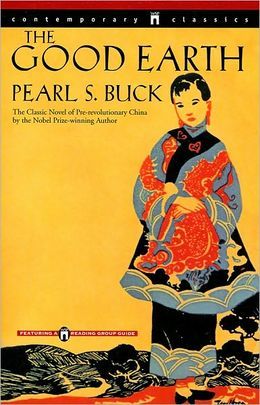 I guess it’s for the best that I’ve put off reviewing a couple of books lately, as I’m tired of audiobooks and it’s taking me forever to read It. I read (listened to) The Good Earth almost a month ago, and my procrastination has nothing to do with how much I liked it. It’s really fantastic.
I guess it’s for the best that I’ve put off reviewing a couple of books lately, as I’m tired of audiobooks and it’s taking me forever to read It. I read (listened to) The Good Earth almost a month ago, and my procrastination has nothing to do with how much I liked it. It’s really fantastic.
The downside is that I’ve waited so long to write about it that I don’t have much to say. So it goes.
The Good Earth is the first in a trilogy about life in agrarian China. Wang Lung, a young man, lives with his father and farms his land. He marries a slave from a nearby wealthy family, and his exposure to their lifestyle makes him crave it for himself. As the wealthy family loses money, they begin to sell off their land, and Wang Lung is able to by parts of it piece by piece after good harvests. One year, after he has children, a terrible drought forces Wang Lung and his family to move to a southern city and experience near homelessness there until the poor people living around him break into a lord’s house, and he and his wife steal some of that lord’s money and are able to return to their land. They have several years of good harvests and continue to buy the previously wealthy family’s land, and Wang Lung becomes ever closer to his dreams of his own wealth and estate.
(Summaries around the internet give the story a different slant. Interesting.)
I really enjoyed The Good Earth. It had been on my radar for several years, but I hadn’t read it because someone whose opinion I respected years ago told me that it would bore me. That might have been the case when I was in college, but now it certainly isn’t. Without too much of a spoiler, I will say, though, that I’m very hesitant to read the rest of the trilogy because I have a feeling they’ll be depressing. Not that The Good Earth isn’t, in a way, even though Wang Lung and his family prosper.
What all of this means is that if you’ve been considering reading The Good Earth, do it. It’s worth it. It probably isn’t for action fans, but if you like historical novels (which I generally don’t), you’ll like this one. I’m not sure of a good gauge for the type of person who might or might not like it, though, which seems a bit strange. So. Classics and history but not YA? That sounds about right.
Photo credit: Thomas Fisher Rare Book Library

